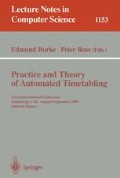Abstract
In this paper, the development and implementation of a university examination scheduling system, based on a genetic algorithm, is described. The system has been used for scheduling examinations in two real instances so far at Middle East Technical University, involving 682 exams in one case and 1449 exams in the other. The methods employed are described including two adaptive mutation operators that yielded a more robust genetic search, a proximity matrix for efficient computation of the fitness function, a scaled conflict matrix and temporal suspension of highly conflicting exams resulting in schedules with better patterns.
Most of the work described in this study was carried out as part of the author's master's thesis and the author thanks the thesis supervisors Dr. Göktürk Üçoluk and Dr. Halit Oguztüzün for their contributions and motivation.
The author was the project manager of Registrar's Office Automation System at Middle East Technical University's Computer Center during this study.
Preview
Unable to display preview. Download preview PDF.
References
Arani T., Karwan M.H., Lotfi V., “A Langrangian Relaxation Approach to Solve the Second Phase of the Exam Scheduling Problem”, European Journal of Operational Research, Vol. 34, No. 3, pp. 372–383, 1988.
Balakrishnan N., “Examination Scheduling: A Computerized Application”, Omega, Vol. 19, No. 1, pp. 37–41, 1991.
Broder S., “Final Examination Scheduling”, Communications of the ACM, Vol. 7, 494–498, 1964.
Burke E.K., Elliman D.G., Weare R.F., “A Genetic Algorithm Based University Timetabling System”, East-West Conf. on Computer Technologies in Education, Vol. 1, pp. 35–40, Crimea, Ukraine, 19–23 Sept. 1994.
Carter M. W., Laporte G., Chinneck J.W., “A General Examination Scheduling System”, Interfaces, Vol. 24. No. 3, pp. 109–120, 1994.
Cobb H.G., Grefenstette J.J., “Genetic Algorithms for Tracking Changing Environments”, Proc. of the Fifth Int. Conf. on Genetic Algorithms, pp. 523–530, Morgan Kaufmann, San Mateo, CA, 1993.
Cole A.J., “The Preparation of Examination Timetables Using a Small-Store Computer”, Computer Journal, Vol. 7, pp. 117–121, 1964.
Corne D., Ross P., Fang H.-L., “Fast Practical Evolutionary Timetabling”, Lecture Notes in Computer Science, Vol. 865, pp. 250–263, Springer-Verlag, 1994.
Davis L., editor, Handbook of Genetic Algorithms, Van Nostrand Reinhold, New York, 1991.
Descroches S., Laporte G., Rousseau J.M., “HOREX: A Computer Program for the Construction of Examination Schedules”, INFOR, Vol. 16, No. 3, pp. 294–298, 1978.
Ergül, A., “A Genetic Algorithm for University Examination Scheduling”, Unpublished M.Sc. Thesis, Dept. of Computer Eng., Middle East Technical University, 1995.
Fogarty T.C., “Varying the Probability of Mutation in Genetic Algorithms”, Proc. of the Third Int. Conf. on Genetic Algorithms, pp. 104–109, 1989.
Foxley E., Lockyer K., “The Construction of Examination Timetables by Computer”, Computer Journal, Vol. 11, pp. 264–268, 1968.
Goldberg D.E., Genetic Algorithms in Search, Optimization and Machine Learning, Addison-Wesley, Reading, MA, 1989.
Lotfi V., Cerveny R., “A Final-Exam-Scheduling Package”, Journal of the Operational Research Society, Vol. 42, No. 3, pp. 205–216, 1991.
Peck J.E.L., Williams M.R., “Algorithm 286: Examination Scheduling”, Communications of the ACM, Vol. 9, No. 6, pp 433–434, 1966.
Ross P., Corne D., Fang H.-L., “Improving Evolutionary Timetabling with Delta Evaluation and Directed Mutation”, Parallel Problem Solving from Nature III, Y. Davidor ed., Springer-Verlag, 1994.
Srinivas M., Patnaik L.M., “Adaptive Probabilities of Crossover and Mutation in Genetic Algorithms”, IEEE Trans. on Systems, Man and Cybernetics, Vol. 24, No. 4, pp. 656–667, 1994.
Whitley D., Starkweather, D., “GENITOR-II: A Distributed Genetic Algorithm”, J. Expt. Theor. Artif. Intell., Vol. 2, pp. 189–214, 1990. (As cited in Srinivas&Patnaik, 1994)
Wood D.C., “A System for Computing University Examination Timetables”, Computer Journal, Vol. 11, pp. 41–47, 1968.
Author information
Authors and Affiliations
Editor information
Rights and permissions
Copyright information
© 1996 Springer-Verlag Berlin Heidelberg
About this paper
Cite this paper
Ergül, A. (1996). GA-based examination scheduling experience at Middle East Technical University. In: Burke, E., Ross, P. (eds) Practice and Theory of Automated Timetabling. PATAT 1995. Lecture Notes in Computer Science, vol 1153. Springer, Berlin, Heidelberg. https://doi.org/10.1007/3-540-61794-9_61
Download citation
DOI: https://doi.org/10.1007/3-540-61794-9_61
Published:
Publisher Name: Springer, Berlin, Heidelberg
Print ISBN: 978-3-540-61794-5
Online ISBN: 978-3-540-70682-3
eBook Packages: Springer Book Archive

